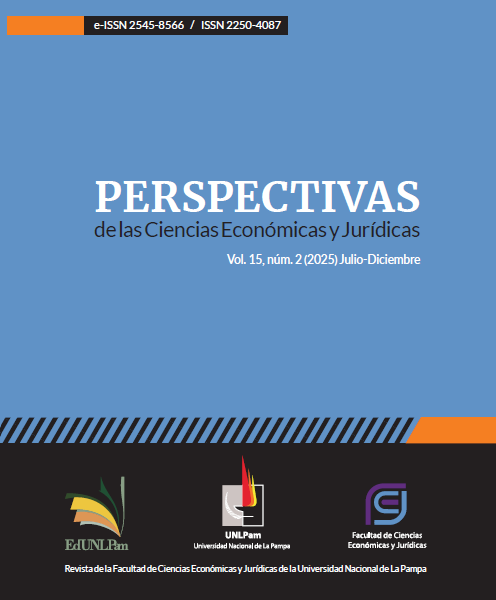Institutional quality and economic performance. Evidence for latin america 1996-2020
DOI:
https://doi.org/10.19137/perspectivas-2025-v15n2a07Keywords:
institutions, development, growth, Latin America, ArgentinaAbstract
The article made two contributions, one methodological and one empirical. On the one hand, various indicators of institutional quality were constructed based on data from international organizations for the period 1996-2020 for a large sample of countries. On the other hand, a correlation of the indicators with an economic variable, per capita income in dollars, was carried out. The results obtained are in line with academic literature and with previous studies. High levels of institutional quality led to high levels of per capita income and vice versa. Comparing between regions, Latin America is located at low and medium levels of institutional quality, far from the countries of East Asia, Western Europe and the United States and approaching Africa. In the case of Argentina, it went from good institutions at the end of the nineties to low institutional quality in the last two decades, especially since 2010. As development theory points out, without good institutions it is not possible to grow in a sustained manner, beyond some favorable situation. Institutional bonds are not eternal.
Downloads
References
Acemoglu, D., Johonson, S., & Robinson, J. (2004). Institutions as the Fundamentals Cause of Long Run Growth. NBER, Working Paper 10481. Cambridge.
Acemoglu, D., & Robinson, J. (2012). Why Nations Fail. New York: Crown Publising Group.
Docquier, F. (2014). Identifying the effect of institutions on economic growth. En Schmiegelow, H. & M. Schmiegelow (eds.), Institutional Competition between Common Law and Civil Law: Theory and Policy, Springer.
Fernández-Torres, Y., Díaz-Casero, JC., & Ramajo-Hernández, J. (2017). Instituciones y crecimiento económico: ¿consenso en la literatura? Journal of Regional Research, 37, 155-185.
Galiani, G., 6 Sened, I. (2014). Institutions, Property Rights, and Economic Growth: The Legacy of Douglass North. Cambridge University Press.
Goldin, C. (1995). Cliometrics and the Nobel. Journal of Economic Perspectives. 9 (2), 191-208.
La Parra-Pérez, A. (2015). El legado de Douglass North: Instituciones, superación e interdisciplinariedad. https://nadaesgratis.es/admin/el-legado-de-douglass-north-instituciones-superacion-e-interdisciplinariedad
Llach, J., & Schiaffino, P. (2013). Crecimiento y desarrollo. Buenos Aires: Ediciones Barbarroja.
Martínez García, H. (2016). Douglass North, 1920-2015. Economía Informa, 398, 108-116.
North, D. (1993). Instituciones, cambio institucional y desempeño económico. Buenos Aires: Fondo de Cultura Económica.
North, D. (1991). Institutions. Journal of Economic Perspectives, 5 (1), 97-1 12.
North, D. (1997). Cliometrics--40 Years Later. American Economic Review, 87 (2), 412-414.
Ochoa, M., & Albornoz, M. (2021). Calidad institucional y desempeño económico en el largo plazo. Working paper. Fundación CECE y FCE-UNLZ. Recuperado de https://fcece.org.ar/calidad-institucional-y-desempeno-economico-en-el-largo-plazo/
Pritchett, L. (1997). Divergence, Big Time. Journal of Economic Perspectives. 11 (3), 3–17.
Romer, D. (2006). Macroeconomía avanzada. México: Mc Graw Hill.
Rosende, F. (2008). Las instituciones en el crecimiento económico. Estudios Públicos, 111, 23-55.
Vargas Chanes, D., & González Núñez, J. (2018). El efecto de las instituciones en el crecimiento económico de América Latina. Perfiles Latinoamericanos, 26 (51), 329-349.
Vijayaraghavan, M., & William, W. (2001). Institutions and Economic Growth: Empirical Evidence for a Cross-National Analysis. Working Papers 112952, Clemson University, Center for International Trade.
Wanjuu, L., & Le Roux, P. (2017). Economic institutions and economic growth: Empirical evidence from the Economic Community of West African States. South African Journal of Economic and Management Sciences. 20(1).
Williamson, J. (2010). Five centuries of Latin American income inequality. Revista De Historia Económica / Journal of Iberian and Latin American Economic History, 28(2), 227-252.
Downloads
Published
Issue
Section
License
Aquellos autores/as que tengan publicaciones con esta revista, aceptan los términos siguientes:- Los autores/as conservarán sus derechos de autor y garantizarán a la revista el derecho de primera publicación de su obra, el cuál estará simultáneamente sujeto a la Licencia de reconocimiento de Creative Commons que permite a terceros compartir la obra siempre que se indique su autor y su primera publicación esta revista.
- Los autores/as podrán adoptar otros acuerdos de licencia no exclusiva de distribución de la versión de la obra publicada (p. ej.: depositarla en un archivo telemático institucional o publicarla en un volumen monográfico) siempre que se indique la publicación inicial en esta revista.
- Se permite y recomienda a los autores/as difundir su obra a través de Internet (p. ej.: en archivos telemáticos institucionales o en su página web) antes y durante el proceso de envío, lo cual puede producir intercambios interesantes y aumentar las citas de la obra publicada. (Véase El efecto del acceso abierto).











.png)



5.jpg)












